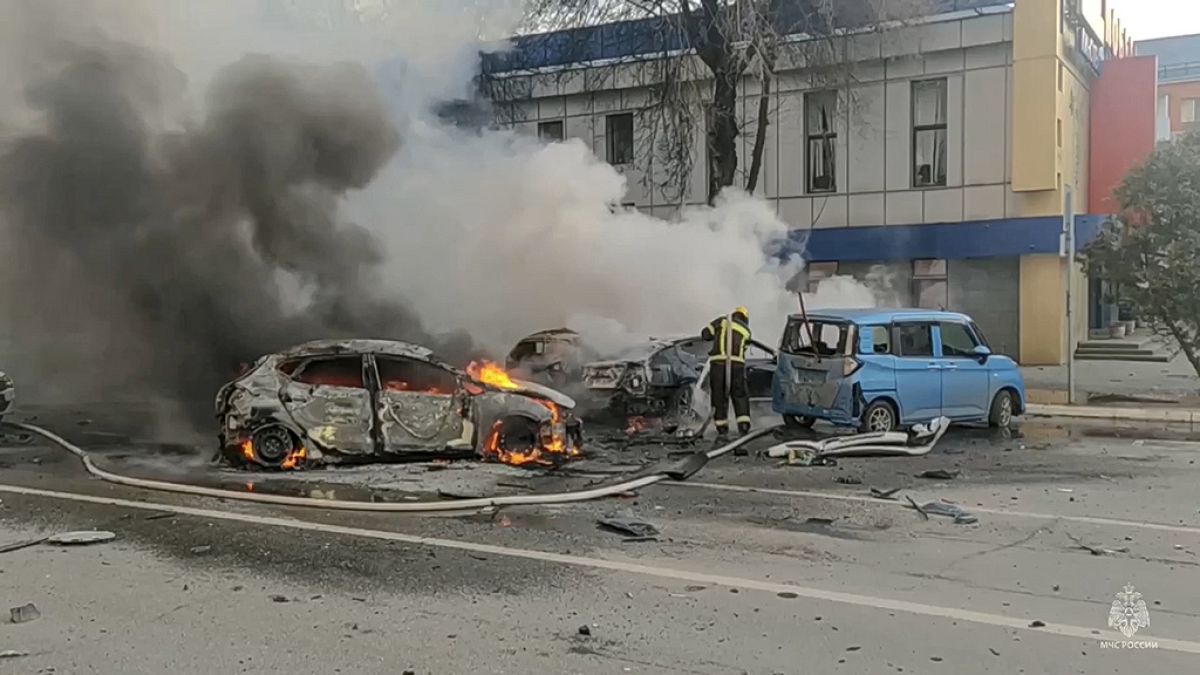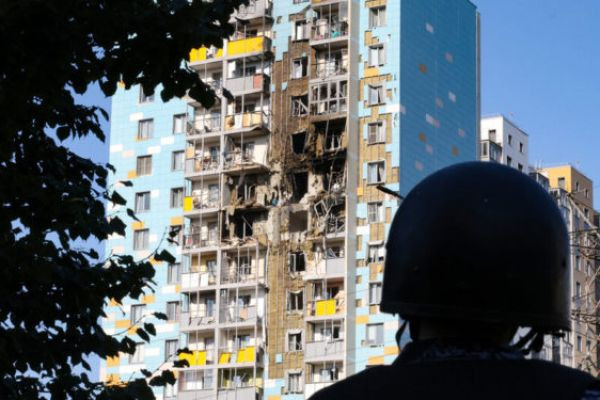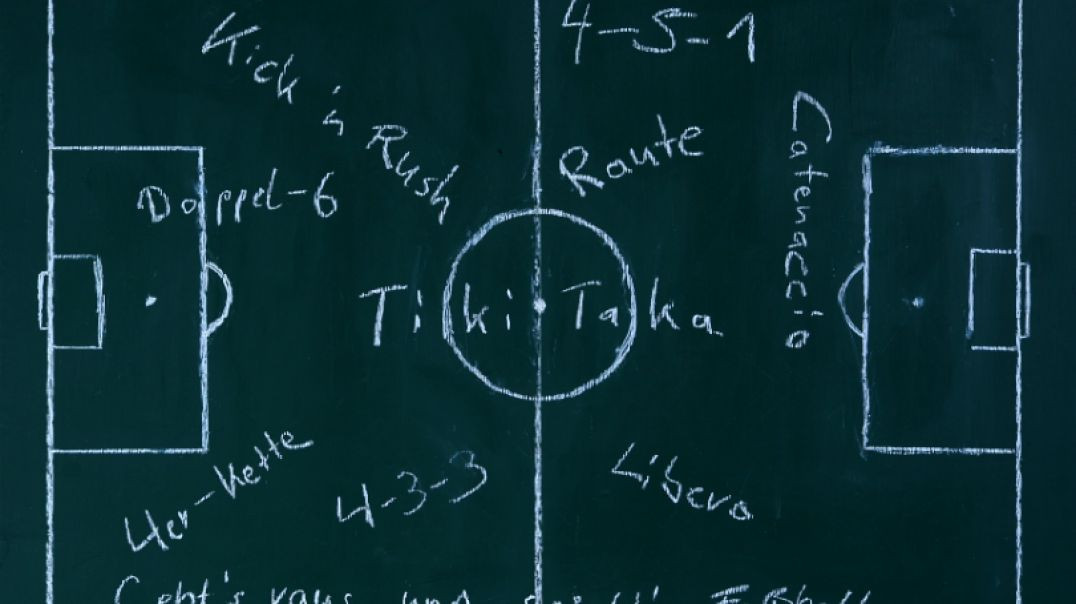The war between Ukraine and Russia, which has raged since Russia's invasion in February 2022, has taken a new and dangerous turn. In a bold move, Ukraine launched a massive drone barrage deep into Russian territory, striking key infrastructure targets and bringing the war closer to Moscow than ever before. This latest development marks a significant escalation in the conflict, as Ukraine demonstrates its increasing ability to strike within Russia, a country once considered far out of reach. The drone attacks not only highlight the evolving nature of modern warfare but also have profound implications for the broader geopolitical landscape and the future of the conflict.
The Drone Barrage: What Happened?
In a coordinated operation, Ukraine launched a series of drone strikes targeting several regions in Russia, including locations near Moscow. According to reports, dozens of drones were deployed, with many successfully hitting their intended targets, while others were intercepted by Russian air defenses. The strikes targeted military facilities, communication centers, and logistical hubs, aiming to disrupt Russia’s war capabilities and weaken its ability to sustain the ongoing conflict.
For months, Ukraine has steadily increased its use of unmanned aerial vehicles (UAVs) or drones in its defense efforts against Russian aggression. However, this latest drone barrage marks the most ambitious and far-reaching operation yet, with the drones penetrating deeper into Russian airspace than ever before. Some reports even suggest that drones were seen flying over Moscow, causing alarm among the city's residents and raising questions about the vulnerability of Russia’s air defense systems.
The use of drones in warfare is not new, but Ukraine’s growing expertise in deploying these weapons has allowed it to strike at the heart of Russia’s military infrastructure. The Ukrainian military has made no secret of its efforts to develop advanced drone capabilities as part of its broader strategy to level the playing field against Russia’s superior military might.
Why the Drone Attacks Are a Turning Point
Ukraine’s drone barrage is significant for several reasons. First, it represents a clear shift in Ukraine’s strategy, moving from a purely defensive posture to one that involves deep strikes into Russian territory. By targeting infrastructure within Russia, Ukraine is sending a strong message to Moscow: the war is no longer confined to Ukrainian soil, and Russia will face direct consequences for its continued aggression.
Second, the attacks bring the war closer to Moscow than ever before. While previous Ukrainian strikes had targeted Russian-controlled territories in eastern Ukraine or the Crimean Peninsula, this latest offensive reaches well into Russia’s interior, shaking the perception that Moscow is far removed from the conflict. The psychological impact of this cannot be understated. For Russian citizens, especially those in Moscow, the war has often felt distant, with few tangible consequences for daily life. Now, with drones flying over their heads, the reality of the war is hitting home in a way it hasn’t before.
Finally, the drone attacks underscore the changing nature of modern warfare. Drones offer a relatively low-cost, high-impact way for a smaller military like Ukraine’s to strike at a larger and more powerful adversary. They are difficult to detect and intercept, making them a valuable tool for asymmetric warfare. For Ukraine, which cannot match Russia’s military capabilities in terms of conventional forces, drones provide a way to hit strategic targets without risking the lives of soldiers.

The Russian Response
Russia’s reaction to the drone strikes has been swift and predictable. The Kremlin has condemned the attacks, accusing Ukraine of escalating the conflict and threatening retaliation. Russian President Vladimir Putin vowed to strengthen Russia’s air defenses and take decisive action to protect the country’s borders. The Russian Ministry of Defense claimed that the majority of the drones were intercepted, though independent reports suggest that many did reach their targets.
Russia’s ability to prevent future drone attacks will be a key test of its military’s competence. While Russian air defenses are considered some of the most advanced in the world, the successful penetration of drones deep into Russian territory raises questions about the effectiveness of those systems. If Ukraine can continue to launch such attacks with impunity, it will erode confidence in Russia’s military capabilities and expose vulnerabilities that could be exploited in future operations.
There is also concern that Russia may respond to the drone barrage by intensifying its attacks on Ukrainian cities and infrastructure. In the past, Russia has reacted to Ukrainian offensives with heavy missile and artillery bombardments, targeting civilian areas in an attempt to weaken Ukraine’s resolve. The question now is whether Russia will escalate its military response further, potentially broadening the scope of the conflict and leading to more civilian casualties.
The International Reaction
The international community is closely watching the developments in Ukraine, and the drone barrage has drawn mixed reactions from global leaders. Western allies, including the United States and European Union, have reiterated their support for Ukraine, praising its resilience and right to defend itself against Russian aggression. However, there are also concerns that the escalation of the conflict could lead to unintended consequences, including a wider war that draws in other nations.
NATO countries have been cautious in their response, with some leaders urging restraint and calling for a renewed focus on diplomatic efforts to end the conflict. At the same time, NATO has continued to provide military aid to Ukraine, including advanced weaponry that has been instrumental in its defense efforts. The use of drones in particular has raised questions about the role of advanced technology in warfare and the need for clearer international regulations governing their use.
China, which has positioned itself as a mediator in the conflict, has expressed concern over the escalation and called for both sides to engage in dialogue. However, Beijing has stopped short of condemning Russia’s invasion, reflecting its complicated relationship with Moscow. Other nations, including India and Turkey, have also called for de-escalation, though they remain wary of taking sides in the conflict.
Implications for the War and Beyond
The drone barrage represents a pivotal moment in the Ukraine-Russia conflict. For Ukraine, it demonstrates a growing confidence in its ability to strike back against Russia, even as it faces overwhelming odds on the battlefield. By taking the war closer to Moscow, Ukraine is shifting the dynamics of the conflict, forcing Russia to confront the reality that its own territory is no longer safe from attack.
However, this escalation also carries significant risks. As Ukraine steps up its offensive operations, Russia may respond with even greater force, leading to more destruction and loss of life on both sides. The drone attacks could also embolden other nations involved in conflicts around the world to use similar tactics, raising concerns about the future of warfare and the potential for drones to be used in increasingly destructive ways.
In the short term, the drone barrage will likely force Russia to reallocate resources toward defending its territory, potentially weakening its ability to sustain its military operations in Ukraine. At the same time, it may also harden Russian resolve and lead to more aggressive military tactics aimed at breaking Ukraine’s resistance.
For the broader international community, the drone strikes highlight the need for continued diplomatic efforts to bring an end to the conflict. While Ukraine has the right to defend itself, the ongoing escalation risks prolonging the war and leading to even greater devastation. The challenge for global leaders will be to find a path toward peace while supporting Ukraine’s efforts to maintain its sovereignty.
Conclusion
The Ukrainian drone barrage targeting Russia is a bold and unprecedented move that signals a shift in the conflict's dynamics. By striking deep into Russian territory, Ukraine has demonstrated its growing military capabilities and sent a clear message to Moscow that the war is far from over. As the conflict continues to evolve, the international community must remain vigilant, supporting efforts to de-escalate the situation while standing firmly with Ukraine in its fight for independence. The future of the conflict remains uncertain, but one thing is clear: the war is no longer confined to the borders of Ukraine, and its impact will be felt far and wide.



